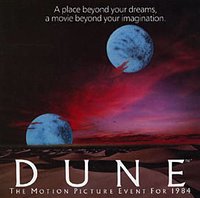
One of old friend and I watched the film, "Dune" in 1984. It was a rather old film and we watched in the Oriental theatre which has since closed down. He was one of my closest friend, who lived in Tiong Bahru. We studied the same school, but after we left, he gave me his address which I have misplaced them.
So, when i remember this film, i will think of him,always.
The story:
Set in a distant future where life in the universe and space travel is dependent upon a spice found only on the planet Dune, this film tracks the rise of young Paul Atreides, son of good Duke Lito, from the time of his father's betrayal and murder by a rival lord, Baron Harkonnen, to his discovery of the great secret behind the planet Dune and his own destiny, which is to free the planet and its denizens of the cruel rule of the Emperor.
At that time, the film was not a big hit and not many will remember. But for me,I continued on by reading the book by its author, Frank Herbert.(i have a friend who was name Herbert Cheah. He was formly from RSAF).
There were total 6 books, the first book being Dune, following it with Dune Messiah, Children of Dune and God Emperor of Dune. the fifth was Heretics of Dunet and last Chapterhouse Dune, which tied up many of the saga's story threads. This was to be Herbert's final single work — he died of pancreatic cancer on February 11, 1986, in Madison, Wisconsin, at the age of 65.
Quotation:
I think science fiction does help, and it points in very interesting directions.
It points in relativistic directions. It says that we have the imagination for these other opportunities, these other choices. We tend to tie ourselves down to limited choices. We say, "Well, the only answer is...." or, "If you would just. . . ." Whatever follows these two statements narrows the choices right there. It gets the vision right down close to the ground so that you don't see anything happening outside.
Humans tend not to see over a long range. Now we are required, in these generations, to have a longer range view of what we inflict on the world around us. This is where, I think, science fiction is helping. I don't think that the mere writing of such a book as Brave New World or 1984 prevents those things which are portrayed in those books from happening.
But I do think they alert us to that possibility and make that possibility less likely. They make us aware that we may be going in that direction.
Frank Herbert.
Frank Herbert used his science fiction novels to explore complex ideas involving philosophy, religion, psychology, politics and ecology, which have inspired many of his readers to become interested in these areas. The underlying thrust in Frank Herbert's work was his fascination with the question of human survival and evolution. Frank Herbert has attracted a fanatical fanbase, many of whom have tried to read everything Frank Herbert has written, fiction or non-fiction, and see Frank Herbert as something of a guru. Indeed such was the devotion of some of his readers that Frank Herbert was at times accused of trying to create a cult.
There are a number of key themes in Herbert's work:
A concern with Leadership. He especially explored the human tendency for human beings to follow charismatic leaders slavishly. He delved deeply into both the flaws and potentials of bureaucracy and government.
Herbert was probably the first science fiction author to popularise ideas about Ecology and Systems Thinking. He stressed the need for humans to think both systematically and long term.
The relationship between religion, politics and power.
Human survival and evolution: Herbert writes of the Fremen, the Sardaukar, and the Dosadi, who are molded by their terrible living conditions into dangerous super-races.
Human possibilities and potential: Herbert offered Mentats, the Bene Gesserit and the Bene Tleilax as different visions of human possibilities.
The nature of sanity and madness. Frank Herbert was interested in the work of Thomas Szasz and Anti-psychiatry.
The possible effects and consequences of consciousness altering chemicals, such as Spice in the Dune saga.
How language shapes the way people think. More specifically Frank Herbert was influenced by Alfred Korzybski's General Semantics Sociobiology. How our instincts unconsciously influence our behaviour and society. Learning, teaching and thinking.
Frank Herbert carefully refrained from offering his readers firm answers to many of the questions he explored.
2 comments:
Somehow i always felt Dune was rather boring compared to the Star Wars and Star Trek movie series ;) Borrowed its LD many years ago to watch, but just didn't quite catch what was going on.
you should read the book..it was more interesting in tha way..you will the missing parts in the book, but it will a tough one..the book was quite thick.cheers
Post a Comment